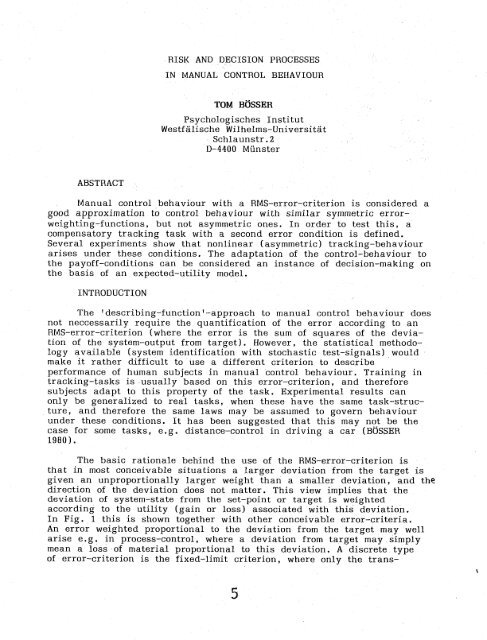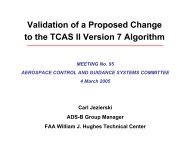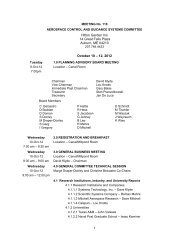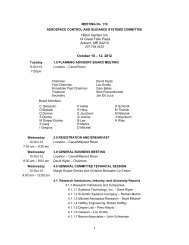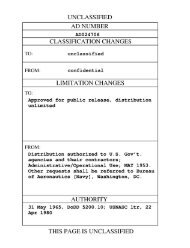- Page 1 and 2: AFWAL-TR'83-3021 PROCEEDINGS OFTHEE
- Page 3 and 4: UNCLASS I FI ED SECURITY CLASSIFiCA
- Page 6 and 7: CONFERENCE CHAIRMAN : FrankL. Georg
- Page 8 and 9: Eleventh Annual Conference on Manua
- Page 10 and 11: CONTENTS(Cont' d) PAGE 6. A FUZZY M
- Page 12 and 13: CONTENTS(Concluded) PAGE 4. DEXTERO
- Page 14 and 15: AN INFORMATIONTHEORETICMODELOF THE
- Page 18 and 19: In order to investigate manual cont
- Page 20 and 21: may represent particularly efficien
- Page 22 and 23: Results are summarized in Fig.7: In
- Page 24 and 25: TABLE 1 "..,_BORDER- ABOV_ ' BELOW
- Page 26 and 27: 0.25, !/% 0.25 " I)'I I 1 1 ' I -5.
- Page 28 and 29: FIG .6 PERFORMANCE OPERATING CURVE
- Page 30 and 31: TIMEDOMAIN IDENTIFICATIONOFPILOT DY
- Page 32 and 33: The human limitationsmodeled includ
- Page 34 and 35: RATING FROM SIMULATION I I , I I I
- Page 36 and 37: The identificationmethod proposed i
- Page 38 and 39: With regard to the remainingterms i
- Page 40 and 41: The algorithm is as follows: 1) Sel
- Page 42 and 43: CLASSICALRESULTS Up(S) " ' - YP Yc
- Page 44 and 45: EXAMPLE PLANT: = 11,7 S ec(s) 3,67
- Page 46 and 47: m m oo --_ ::_ ---I oo o
- Page 48 and 49: Conversely, the "corrected" set use
- Page 50 and 51: Although improvedmethods are curren
- Page 52 and 53: A TEST OF FITTS' LAW IN TWO DIMENSI
- Page 54 and 55: INTRODUCTION We have undertaken a m
- Page 56 and 57: ecomes smaller as the tonic pupil s
- Page 58 and 59: i i i • 1 .......................
- Page 60 and 61: FIGURE 3 : Test conditions for pupi
- Page 63 and 64: k_ (A) : [,'J o_:. \ -80- [_J [....
- Page 65 and 66: DISCUSSION Before attempting anothe
- Page 67 and 68:
Edinger-Westphal nucleus. CONCLUSIO
- Page 69 and 70:
COMPUTATIONALPROBLEMSIN HUMAN OPERA
- Page 71 and 72:
These time series analysismethods h
- Page 73 and 74:
The parametersn and m were chosen u
- Page 75 and 76:
models with m > I, m = 1 is chosen
- Page 77 and 78:
SAMPLING INTERVAL 0.1 SEC Fig. 3-a
- Page 79 and 80:
where H(z) is the transfer function
- Page 81 and 82:
TABLE 1. TRANSFERFUNCTION.MODEL:WIT
- Page 83 and 84:
Although the time series analysis i
- Page 85 and 86:
(10) Jex, H. R., and Allen, R. W.,
- Page 87 and 88:
CL{ANGES IN HUMAN JOINT COMPLIANCE
- Page 89 and 90:
esponse, but what that might be rem
- Page 91 and 92:
esulting angular position and stret
- Page 93 and 94:
mechanical consequences of the myot
- Page 95 and 96:
Merton, P.A. Speculations on the se
- Page 97 and 98:
p_ 10.0 FREQUENCY (HZ) 1.0 II111 "o
- Page 99 and 100:
...... E RJR042/056 ANGLE TA EMG SO
- Page 101 and 102:
aooT I- jU >_ EO '__ o i// V_. - \m
- Page 103 and 104:
-100 300 AO UJ GLG589 .J O Z -100 J
- Page 105 and 106:
- 22 MIN CO um UJ • - -500 JLEO 3
- Page 107 and 108:
RECORD f (hZ) _ J B K CONTROL 1 1.8
- Page 109 and 110:
ABSTRACT for 18th
- Page 111 and 112:
4). For example,in order to optimal
- Page 113 and 114:
For example, when system error and
- Page 115 and 116:
REFERENCES I. Birmingham, H.P,, and
- Page 117 and 118:
Ar ea 2 / A1 Area 2_ -A2 -A1 X Theo
- Page 119 and 120:
determinedboth by his interfacewith
- Page 121 and 122:
Procedure The subject sat before th
- Page 123 and 124:
e used in designingdiscrete-timetas
- Page 125 and 126:
Factor Beta-weight Beta-weight Cour
- Page 127 and 128:
SUSTAINEDTURN POSITIONING EXTENDING
- Page 129 and 130:
DEVELOPMENT OF PERFORMANCE MEASURES
- Page 131 and 132:
performed all nine conditions. Ther
- Page 133 and 134:
REFERENCES Moray, N. 1979. Mental W
- Page 135 and 136:
|'0 _L_ o.S, K _/.s K/5" K/S_ - - -
- Page 137 and 138:
RATING CONSISTENCY AND COMPONENT SA
- Page 139 and 140:
also mounted on the left arm of the
- Page 141 and 142:
necessitating continued attention b
- Page 143 and 144:
4_4 4_4141 4_4_0 00 OVERALLWORKLQAD
- Page 145 and 146:
whereas increasing the bandwidth fr
- Page 147 and 148:
Figure 3. He.an ratings and signifi
- Page 149 and 150:
Figure 4.. Hean ratings and signifi
- Page 151 and 152:
Figure 5. Mean ratings and signific
- Page 153 and 154:
._ o ,.,_m F-_rt o :1 ,-q x €:._
- Page 155 and 156:
Level (_-.585, E
- Page 157 and 158:
ing related to Overall Workload or
- Page 159 and 160:
Steinlnger, K. Subjective ratings o
- Page 161 and 162:
discriminable changes in the score
- Page 163 and 164:
RESULTS The computed scores for eac
- Page 165 and 166:
In general, the results of the expe
- Page 167 and 168:
TABLE 2 Workload Assessment Techniq
- Page 169 and 170:
TABLE 4 Logical Classification of T
- Page 171 and 172:
1.0 1 Q.S N z_ = -O,S = _€ -1,0 L
- Page 173 and 174:
SESSION3: SIMULATIONAND MODELBASEDA
- Page 175 and 176:
_ation For Time DelaysIn FlightSimu
- Page 177 and 178:
AN AUTOMOBILEAND SIMULATORCOMPARISO
- Page 179 and 180:
particularilycritical during the ac
- Page 181 and 182:
performanceduring productionruns wa
- Page 183 and 184:
using roadway cues from the left la
- Page 185 and 186:
epresentingan automobilefor a later
- Page 187 and 188:
PerformanceParameters D OVER C - T
- Page 189 and 190:
TRANSFEROF LEARNING GROUP 1 (SIMULA
- Page 191 and 192:
5.25m l.Tm _- --- I / _ I I ! i i 0
- Page 193 and 194:
FIGURE4 INSTRUMENTEDVEHICLEDURING O
- Page 195 and 196:
AN OPTIMAL CONTROL MODEL ANALYSIS O
- Page 197 and 198:
current standards) could result in
- Page 199 and 200:
ft/sec and 1.42 ft/sec, respectivel
- Page 201 and 202:
Table i. PERCEPTUAL THRESHOLDS* Var
- Page 203 and 204:
m Variable "Maximum" Allowable Devi
- Page 205 and 206:
given in Table 4. Also shown in the
- Page 207 and 208:
Table 5. MODEL PREDICTIONS FOR DIFF
- Page 209 and 210:
ii A io o _ 9 Delay = 133 ms i .,-4
- Page 211 and 212:
i0 _. Delay = 133 ms o 1.4 I .,,4 _
- Page 213 and 214:
sensitivity of the OCM to increases
- Page 215 and 216:
[6] Ricard, G.L., R.V. Parrish, B.R
- Page 217 and 218:
Air Force Aerospace Medical Researc
- Page 219 and 220:
III. TASK ANALYSIS USING SAINT In o
- Page 221 and 222:
equired to detect the target, The c
- Page 223 and 224:
Examination of histograms of these
- Page 225 and 226:
EXP: SClII COND 19 (FLYBY 1, EW, EC
- Page 227 and 228:
conditions corresponding to particu
- Page 229 and 230:
o 0 _ oD _ • eo olo ooee ee I I I
- Page 231 and 232:
• oeo_ eeee eoJo 0 0 0 0 0 0 0 0
- Page 233 and 234:
REFERENCES I. Kleinman, D.L. and To
- Page 235 and 236:
screen according to a pre-defined t
- Page 237 and 238:
error signal. The error signal repr
- Page 239 and 240:
Similarly Fig. 11 ,12, and 13 prese
- Page 241 and 242:
.OO3- ,0_. .O01 Figure 6. Tracking
- Page 243 and 244:
(sNnaoot) _._aoa.LV 6U_M paxk:l ,aO
- Page 245 and 246:
2_ T v TRACK AZIMUTH ANGULAR RATECO
- Page 247 and 248:
itl ,ii11 i _l,lJl]illJ_ , i,'i , .
- Page 249 and 250:
manual control data to determine th
- Page 251 and 252:
elative cost penalty on control-rat
- Page 253 and 254:
pilot parameters. Conversely, a mat
- Page 255 and 256:
these changes to parameters that ar
- Page 257 and 258:
TABLE 2 Significance Test of Practi
- Page 259 and 260:
TABLE 3 Effects of Practice on Pilo
- Page 261 and 262:
variable(s) of interest. After para
- Page 263 and 264:
subjects, trained initially fixed-b
- Page 265 and 266:
A MODERNAPPROACHTO PILOTVEHICLEANAL
- Page 267 and 268:
Unfortunately,the methodology suffe
- Page 269 and 270:
DISTURBANCES lqw _ I ! i I MOTOR LA
- Page 271 and 272:
By validatingthat the OCM can be us
- Page 273 and 274:
SESSION4: MODELBASEDDESIGNAND CONTR
- Page 275 and 276:
VALIDATION OF AN ADVANCED COCKPIT D
- Page 277 and 278:
experimental program was conducted
- Page 279 and 280:
0 1 0 0 0 0 0 0 0 1 0 0 0 0 _2U° 3
- Page 281 and 282:
is repeatedfor several values of co
- Page 283 and 284:
assumption. Indeed, including the Y
- Page 285 and 286:
Display System Synthesis STATUS DIS
- Page 287 and 288:
THREE _IMENSIONAL PERSPECTIVE TUNNE
- Page 289 and 290:
Implementation of the flight direct
- Page 291 and 292:
Using these numerical results, the
- Page 293 and 294:
which will not be addressed at this
- Page 295 and 296:
move towards the observer, but the
- Page 297 and 298:
absolute levels of control performa
- Page 299 and 300:
REFERENCES (continued) i0. Grunwald
- Page 301 and 302:
and healthand safety data are accur
- Page 303 and 304:
DESIGN ISSUES IN EMERGING AUTOMATIO
- Page 305 and 306:
complacent. The second issueisa dir
- Page 307 and 308:
_ ' ': _ _: _:_i ¸ i_:_ ,:>_:_ _ '
- Page 309 and 310:
One of the difficulties of the mult
- Page 311 and 312:
overview, the other, detailed views
- Page 313 and 314:
Figures 8 and 9 depict displayedinf
- Page 315 and 316:
REFERENCES Ackoff,RusselL.,"Managem
- Page 317 and 318:
HUMAN - COMPUTER DIALOGUE FRAGMENT
- Page 320 and 321:
FTGURE 4 3i3
- Page 322 and 323:
FIGURE 6 ENTRY_CONTROL INFORMATION
- Page 324 and 325:
HIERARCHICINTEGRATEDINFORHATIONDISP
- Page 326 and 327:
GROUPEDPRIMITIVESINTEGRATEDDISPLAY
- Page 328 and 329:
of functions to be displayed; (3) t
- Page 330 and 331:
APPARATUS The mode selection task w
- Page 332 and 333:
CONCLUSIONSAND RECOMMENDATIONS The
- Page 334 and 335:
AN ANALYSIS OF CONTROL RESPONSES AS
- Page 336 and 337:
The data suggest the need for rethi
- Page 338 and 339:
The ideal flight display is one tha
- Page 340 and 341:
140 WIND- SHEAR z 12_0 CP \ k 0_ I0
- Page 342 and 343:
.6 ELEVATOR POWER SPECTRAL ANALYSIS
- Page 344:
left hand) on the right side of the
- Page 347 and 348:
the presentation of the stimulus wi
- Page 349 and 350:
at the bottom/center of the oscillo
- Page 351 and 352:
References Hartzell, E. J., Dunbar,
- Page 353 and 354:
typically located near the top of t
- Page 355 and 356:
7.1 ¸ It can be argued ni'ng,: e,x
- Page 357 and 358:
effect control. The two hands are p
- Page 359 and 360:
amplitude (A) and the narrowest tar
- Page 361 and 362:
Figure 5. The subject station with
- Page 363 and 364:
equal to 0.5 degrees per second ove
- Page 365 and 366:
CYCLIC MT IPSI CONT l m 1,155 1.387
- Page 367 and 368:
in the contralateral condition for
- Page 369 and 370:
slopes for the two conditions are s
- Page 371 and 372:
References 1. Fitts, P.M. & Seeger,
- Page 373 and 374:
CHARACTERISTICS OF A COMPENSATORY M
- Page 375 and 376:
of a subject via two sets of wet el
- Page 377 and 378:
experimental system contained an ad
- Page 379 and 380:
signals which are band-limitedat la
- Page 381 and 382:
are equal to McRuer and Elkind's av
- Page 383 and 384:
23. K. Tanie, S. Tachi, K. Komoriya
- Page 385 and 386:
I0 _ -...../..._ n, o.5 v_ x/,,,.._
- Page 387 and 388:
-(9- Fc=0.3 Hz Pl=10ms -_- Fc=0.5 H
- Page 389 and 390:
Fc=0.3Hz Fc=0.5Hz 10 Fc=0.8Hz 201 "
- Page 391 and 392:
e 20 20 em 10 •m ------ ------._.
- Page 393 and 394:
SESSION5: HUMAN-MACHINESYSTEMSAND C
- Page 395 and 396:
3. Model mimic techniques use a fai
- Page 397 and 398:
SOURCEHEAD PENDULUM _ LO\ I?_(_ =TC
- Page 399 and 400:
This Configuration Space with its C
- Page 401 and 402:
Y 6 Xo-- _ --_'-e s× C [BY,, to ,.
- Page 403 and 404:
In either the analytic or projectiv
- Page 405 and 406:
no longer holds. \ \ \ \\ \ \ ! \
- Page 407 and 408:
geometric machine with many moving
- Page 409 and 410:
Yo P w_ _ _ _7p t / , °p # # ; / i
- Page 411 and 412:
B. Minimum Information Storage Traj
- Page 413 and 414:
Each machine degree of freedom, as
- Page 415 and 416:
AXIS I FALSE ALARM" IAL ZONE TRUE C
- Page 417 and 418:
3. Kreifeldt,J., Kiel, R., Richichi
- Page 419 and 420:
PERCEPTUAL SCALING OF MOMENT OF INE
- Page 421 and 422:
DATA ANALYSIS Starting at the cente
- Page 423 and 424:
REFERENCES I. Kreifeldt,John G. and
- Page 425 and 426:
DEXTEROUS MANIPULATOR LABORATORY PR
- Page 427 and 428:
deviation appears to increase for T
- Page 429 and 430:
Fig. 2 Manipulator Task Board 424
- Page 431 and 432:
A DIRECTMEAN CTV MEAN • 3.3 TO 1
- Page 433 and 434:
which occur in the AFTI/F-16. In fi
- Page 435 and 436:
Table I - Newman-Keuls Multiple Com
- Page 437 and 438:
,_ Teta!Score MJ TrackingRelated _=
- Page 439 and 440:
(b co I 10 ;K FEED THROUGH H (Degre
- Page 441 and 442:
l, 4 Fo _.CE ST LC._,< l,d O,_ Figu
- Page 443:
i 1.:2 b l sPi..A¢ 9_.1"-!, EklT C
- Page 446 and 447:
proportional or preselected fixed r
- Page 448 and 449:
three microswitches. To latch safel
- Page 450 and 451:
Claw Control Three methods were imp
- Page 452 and 453:
C) Sensor display and visual access
- Page 454 and 455:
Note that the most time consuming s
- Page 456 and 457:
Table I. Time Performance Data of P
- Page 458 and 459:
CONTROL -_ BIAS POSITION BUTTON INP
- Page 460 and 461:
L_ Figure 3. Cylinderand Box Module
- Page 462 and 463:
A C B Figure 5. Latching Mechanism
- Page 464 and 465:
Ca) (b) (c) U"l Figure7. BerthingSe
- Page 471 and 472:
HELICOPTER INTEGRATED CONTROLLER RE
- Page 473 and 474:
METHOD Subjects. Subjects will be n
- Page 475 and 476:
illustrated in Figure 2. Subjects w
- Page 477 and 478:
amp. amp. amp. 4._ rrl _ -.4 --E [_
- Page 479 and 480:
TENTATIVE CRITERIA FOR CONTROLLERS
- Page 481 and 482:
simulator. Most soldiers who comple
- Page 483:
makes a mistake and is otherwise si
- Page 486 and 487:
The major future effort, other than
- Page 488 and 489:
FACTORSAFFECTINGIN-TRAIL FOLLOWINGU
- Page 491 and 492:
DISPLAY CONSIDERATIONS Location Our
- Page 493 and 494:
The three types of spacing cues ill
- Page 495 and 496:
that it tends to smooth out speed v
- Page 497 and 498:
symbology section, can also shed so
- Page 499 and 500:
If we apply the 50-second,5-percent
- Page 501 and 502:
REFERENCES I. Abbott, Terence S.; M
- Page 503 and 504:
TRAFFIC [ SELECTION CDTI ] SENSOR "
- Page 505 and 506:
cZ) P_ Figure6.- Conventionalcockpi
- Page 507 and 508:
\ 8_ Jacoxwaypoint"'_z_ JAC /kS_IG
- Page 509:
Figure I0.- Advanced cockpit CDTI f
- Page 512 and 513:
300 r--- ,,. f 250- _/_j' _ GROUNDS
- Page 514 and 515:
CHARACTERISTICSOF LEADAIRCRAFT STEA
- Page 516 and 517:
_ ' i ' ' ' 300- GROUNDSPEED, 250-
- Page 518 and 519:
An informal analysis of projective
- Page 520 and 521:
on the metric line at the end of th
- Page 522 and 523:
Special thanks to Fumei "Amy" Wu of
- Page 524 and 525:
fig. 2 Tag Placement I _ EYE -_ ' E
- Page 526 and 527:
d.ing A'I"C.,c:harts, maps, weather
- Page 528 and 529:
- I _£2__ , r .I // !-Tr-\ \ \
- Page 530 and 531:
_'_Lm _ 030 . d 195 0S6 Figure 2: A
- Page 532 and 533:
Four instrument-rated general aviat
- Page 534 and 535:
TABLE I: Separation Violations that
- Page 536 and 537:
statist.ic:al analysis. Averages fo
- Page 538 and 539:
than without for" the pilots of the
- Page 540 and 541:
Figure 4 depicts the frequency of s
- Page 542 and 543:
Simulator Pilot Opinion At the conc
- Page 544 and 545:
communications with the addition of
- Page 546 and 547:
cared that the addition of CDTI int
- Page 548 and 549:
AIR TRAFFIC CONTROL OF SIMULATED AI
- Page 550 and 551:
joystick for the control yoke and a
- Page 552 and 553:
shown by a hexagon if the aircraft
- Page 554 and 555:
The number of seconds between an ai
- Page 556 and 557:
LIST OF AUTHORS 553
- Page 558:
AUTHORS CONCLUDED J. L. Lewis 440 E


